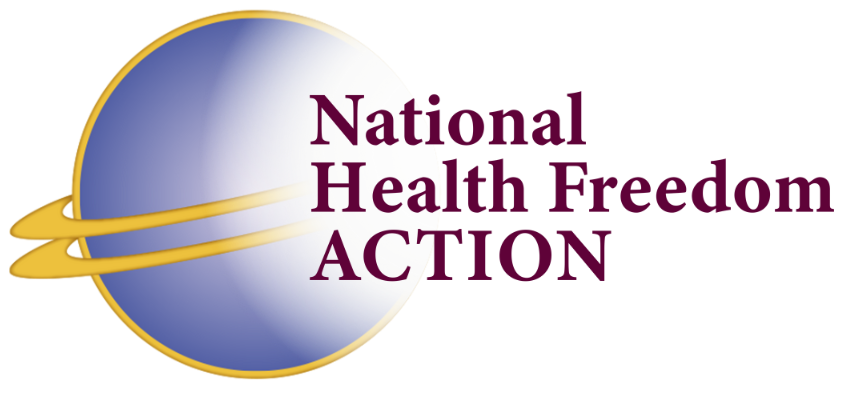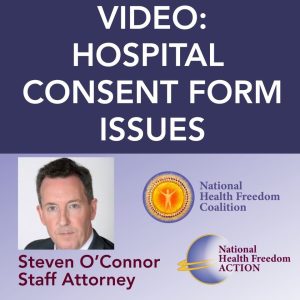
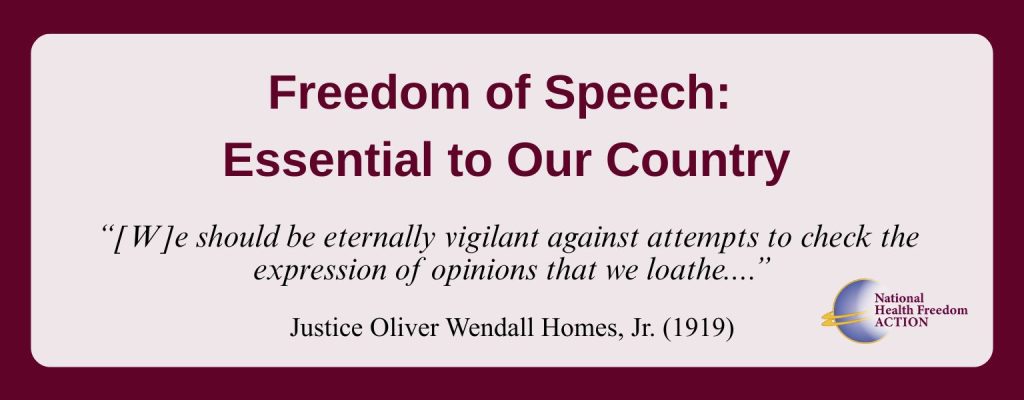
Freedom of speech is not supposed to be a concern here in the United States. After all, freedom of speech and of the press was considered to be the cornerstone of a government of the people and so important that it was directly affirmed in the First Amendment of the Bill of Rights of our Constitution, the highest law of the land. Attacks on freedom of speech are prevalent in totalitarian governments, and the United States has historically opposed totalitarian regimes including Nazism and Fascism and has promoted democracy throughout the world.
So how is it that attacks on freedom of speech are occurring in this country, sometimes in secret and sometimes completely out in the open, especially in the realm of what is called public health? Is this public health messaging and ideology so important that it is allowed to tread heavily on the basic rights of those who dare to speak out and question its messaging, including those who question health mandates and lockdowns, and the scientific claims behind them? Freedom of speech, though it is not absolute and has its legal restrictions, is a bedrock issue for Americans. The government should not interfere with people’s right to express themselves. Over the past 200 years, the Supreme Court has repeatedly weighed in on the limits of free speech, when it can be limited and by whom. In general, freedom of speech applies to freedom from governmental interference, with limits on protection for public speech that includes categories like defamation, fighting words, obscenity, and true threats. Private businesses, on the other hand, may generally legally infringe on speech.
New admissions of censorship
Google has now admitted to what many knew already, that the Biden administration pressured social media companies to censor speech, particularly those who challenged the Covid narrative. In their letter, Google stated that the Biden administration “pressed the company regarding certain user-generated content related to COVID-19 that did not violate [Google’s own] policies.” Further, it was “the Administration’s officials, including President Biden,” who “created a political atmosphere that sought to influence the actions of platforms based on [the administration’s] concerns regarding misinformation.” These private companies appeared to be censoring through their own policies but were actually responding to pressure by the government.
The Biden administration’s secret censorship of speech
In May 2022, plaintiffs for the States of Missouri and Louisiana, led by Missouri Attorney General Eric Schmitt and Louisiana Attorney General Jeff Landry, along with other plaintiffs, sued the Biden administration in Missouri v. Biden, alleging that the administration pressured social media in secret to censor viewpoints (which happened to all be conservative) in violation of the First Amendment. The trial court issued a preliminary injunction, prohibiting members of certain agencies and the administration from contacting social media companies to request censorship except for illegal content. The Biden administration appealed, and defendant Vivek H. Murthy, then the Surgeon General and one of the administration members sued, lent his name to the appeal, which became Murthy v. Missouri.
The Fifth Circuit appellate court in Murthy essentially upheld the trial court and stated that Americans “have the right to engage in free debate about the significant issues affecting the country” and that if what the plaintiffs alleged was true, that the case “arguably involves the most massive attack against free speech in United States’ history.” The Supreme Court dismissed the case not because there were insufficient facts or proof, rather, because of a technicality: “lack of standing.” The Court never heard the merits of the case. Before the latest admission by Google regarding government pressure for censorship, the Twitter files had already revealed similar government pressure. Meta, parent company of Facebook and Instagram, has also admitted to censorship pressure from the government. Some who looked into the efforts of the Biden administration to censor speech have found as many as 57 different ways that this occurred.
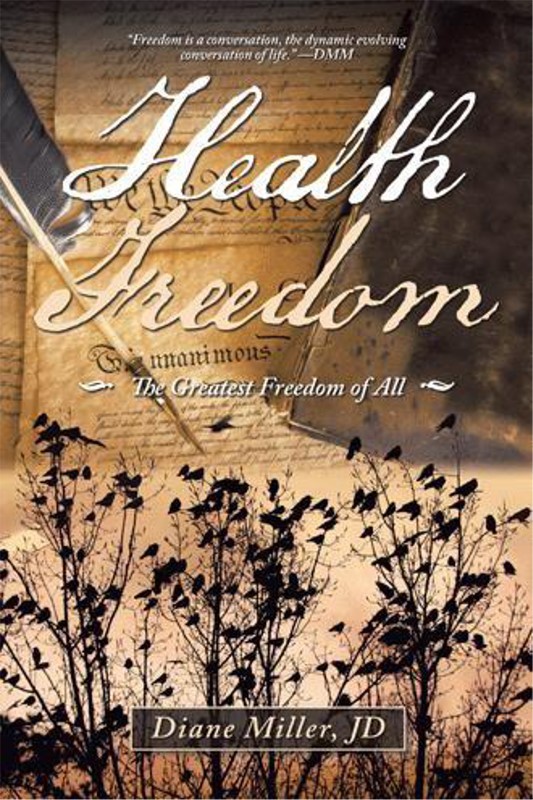
Should there be more protections for speech on social media?
One of the founders of National Health Freedom Action and Coalition, Diane Miller, JD, faced censorship herself at the time. Her book, Health Freedom: The Greatest Freedom of All, was published in 2021 and her publisher attempted to buy advertising on Facebook for the book. Facebook would not allow her book to be promoted; the notification denying the request for advertisement stated that the book would “[f]all under Social/Controversial Issue (book discusses health issues in America).” Certainly the debate over whether social media is a public square or a privately held corporation for purposes of freedom of speech should be addressed.
For freedom of speech, legal details matter
More recently, comedian Jimmy Kimmel on his ABC show made some comments about MAGA and the death of political activist Charlie Kirk. FCC Chair Brendan Carr, speaking about FCC oversight of the public interest obligations of stations like ABC, stated: “These companies can find ways to change conduct to take actions, frankly on Kimmel, or there’s going to be additional work for the FCC ahead.” Many took this as an infringement on freedom of speech. The situation, however, illustrates the complexity of some speech situations. The FCC has the right to regulate speech like deliberate distortions as part of public broadcasting rules, this can include “hoaxes,” which involve stations broadcasting “false information about a crime or catastrophe.” Analysis of many free speech situations must take into account caselaw as well as other rules and regulations.
Confusion over when speech is protected
Perhaps it is the complexity of the law about freedom of speech, or the lack of civics classes in the schools, but many now do not understand when or what speech is protected, even apparently at the highest levels of government. The government, in general, cannot restrict speech based on its content even if the speech is hate speech, disgusting, loathsome, or unpopular. Hate speech is protected. But a public speaker may not incite violence or create a true and immediate threat. Attorney General Pam Bondi did not appear to be tracking with what the law actually says when she stated, “there’s free speech and then there’s hate speech, and there’s no place [for that].” Former Vice-Presidential candidate and Minnesota Governor Tim Walz showed his ignorance of the legal protections of speech in 2022 when he stated, “There’s no guarantee to free speech on misinformation or hate speech, and especially around our democracy.” In one survey, 34% of college students surveyed said that it is okay to use violence to stop speech on campus. There is a crying need for Americans to understand the distinction between speech including hate speech that is broadly protected and other speech like public speech that incites violence which is not.
Supreme Court decision upholding free speech
Justice Sotomayor, writing in May 2024 for the unanimous opinion of the US Supreme Court in another First Amendment freedom of speech case, National Rifle Ass’n v. Vullo, stated that coercion by the government is not constitutionally permissible and that “[g]overnment officials cannot attempt to coerce private parties in order to punish or suppress views that the government disfavors.” She continued that “the critical takeaway is that the First Amendment prohibits government officials from wielding their power selectively to punish or suppress speech, directly or …. through private intermediaries.” (Emphasis added). Since the Biden administration’s pressure on social media was selective because only certain people were censored, under Vullo the actions of the Biden administration in pressuring social media would be unconstitutional.
For practitioners, not just freedom of speech but freedom of practice
Of course, during the COVID-19 pandemic, this infringement on freedom of speech harmed health freedom, as doctors trying to come forth with alternative treatments were deplatformed and silenced. Doctors and lay people sharing information about masking or vaccines were censored as vectors of “misinformation” or “disinformation,” even when strong scientific evidence indicated that the points made were valid and that the practices the information criticized were not themselves based on science and in fact were causing harm. For many medical professionals, speaking up against medical dogma led not just to deplatforming on social media, but also to loss of employment and even their medical licenses. Doctors and others were censored and some even had their right to practice revoked. The public lost valuable information about health and damage was inflicted including at times death.
Expanded practice laws to protect practitioners
But what of less obvious infringements of freedom of speech? Medical doctors must practice according to the “standard of care.” What is that? It is not a scientifically based standard nor is it written down by the state medical board, rather, it is a community standard of care. Doctors are required to use the type of care that other reasonably competent health care practitioners would provide under similar circumstances. So, what is a doctor to do when they wish to replace the usual use of a toxic drug with a non-toxic but more unusual alternative? The “standard of care” can lead to mediocrity and suppresses innovation, especially during public health scenarios like the COVID-19 pandemic. Doctors not only fear speaking out but fear practicing outside of this “standard of care” because their license is on the line, and even potential civil charges, if they do not do what other doctors do. One solution at the state level to protect freedom of speech and practice for doctors is to pass Expanded Practices laws, which allow doctors to use practices outside of the standard of care as long as they meet the requirements set forth in the Expanded Practices laws.
Another form of free speech is a hearing before Congress. Our governmental structure provides a place for free speech. When our elected officials do not allow either a full and fair response from a health official, or do not allow that person even to come forth and testify in response, that is an infringement upon speech that can affect our health freedoms. One recent example was the September 17, 2025 hearing before the Senate Health Committee regarding former CDC Director Susan Monarez and her recent termination from the CDC. At this
hearing Ms. Monarez was allowed to present her viewpoint on “what her lawyers described as her refusal to “rubber-stamp unscientific, reckless directives” and her Chief Medical Director, Dr. Debra Houry, who resigned in protest was also allowed to provide her point of view. HHS Secretary RFK, Jr. was notably absent, as he had not been invited to provide any context for the American public or to rebut
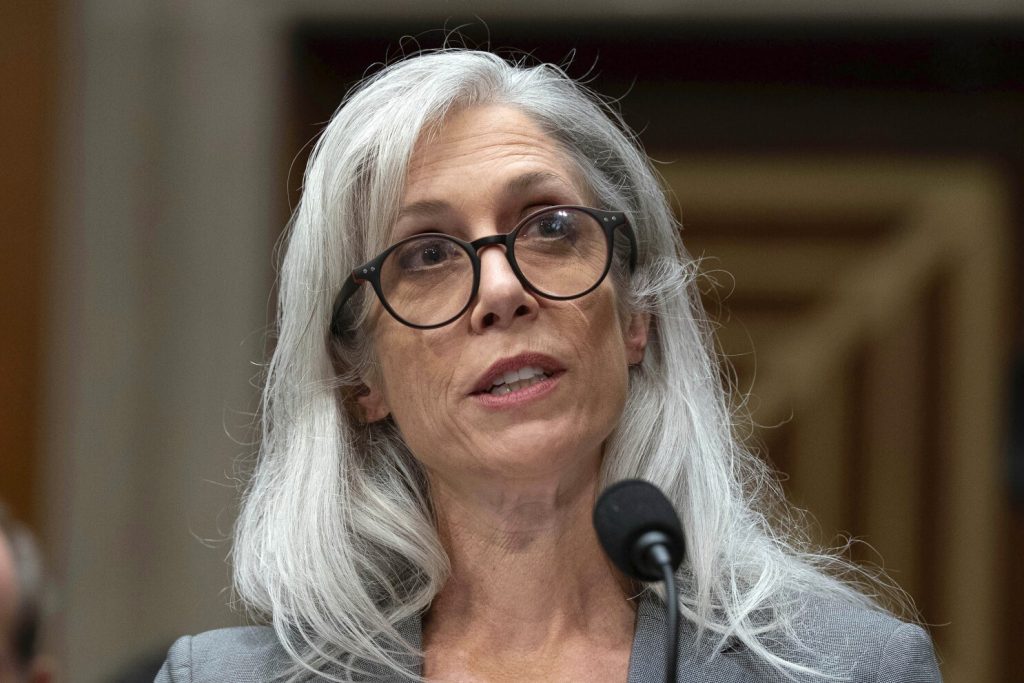
Susan Monarez
Ms. Monarez’s or any other allegations. It was not until the following day, after thousands of phone calls and emails to Senator Bill Cassidy and others, that Kennedy was invited to provide information to the Senate. This hearing appeared to be simply created for media soundbites; a “witch-hunt” of sorts instead of a full and fair hearing on the issues.
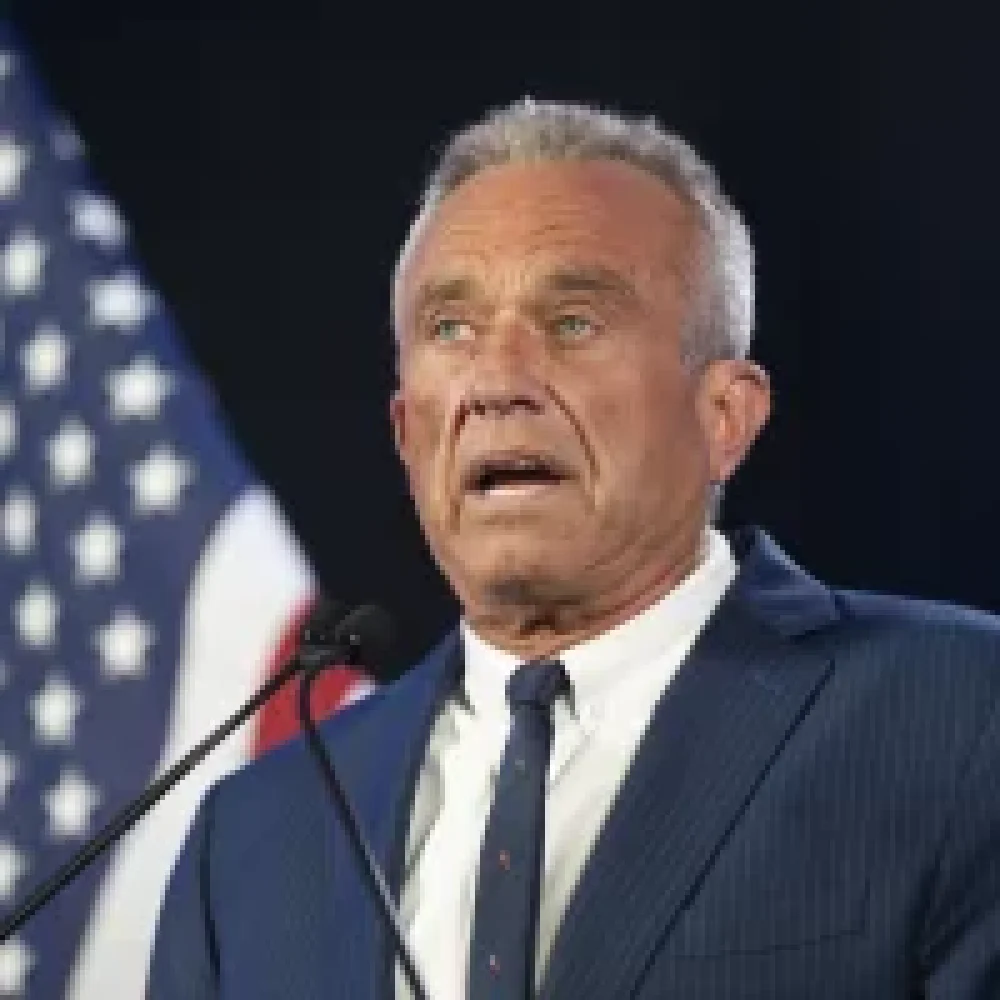
Robert Kennedy Jr,
HHS Secretary
Secretary Kennedy is continually portrayed by the legacy media and many others as an “anti-science” kook. A look into Kennedy shows that this is a distortion of reality. His 2023 book which is on point for the Monarez hearing, “Vax-Unvax: Let the Science Speak,” contains over 100 peer-reviewed scientific studies regarding vaccinated and unvaccinated children. This is a meticulous, detailed critique of vaccines; each study is analyzed and explained. When Kennedy is allowed to speak, he has
scientific facts at the ready, including at the September 4, 2025 Senate Hearing. A democracy should allow information to be conveyed to the public in a free and fair way. Although there were some Senators, particularly Rand Paul, who provided some context, the Senate Health Committee allowed a skewed version of Kennedy to be presented. This sort of one-sided unscientific political theatre censors our ability to understand what our elected officials are doing.
Freedom under assault globally
It is not only the United States that appears to have difficulties understanding and upholding freedom of speech. There is a similar suppression of speech and practices in Canada and Europe. Recently, Ursula von der Leyen, President of the European Commission, set the tone for Europe’s future with her statement that she was “appalled by the disinformation that threatens global progress” and that “we are on the brink – – or even at the start – – of another global health crisis.” Her solution was to create a “Global Health Resilience Initiative” where clearly part of the initiative will be to fight medical “disinformation” which likely will involve censorship. Von der Leyen wishes the censorship to be more globally coordinated, which it likely will be.
Awareness of censorship important
And so, upon review, it appears that freedom of speech and of the press, that healthcare providers are not always honored as we’d think they would be. The US, Canada, and Europe portray themselves as bastions of freedom, yet the reality is not so simple. There are government attempts to whittle away these freedoms which needs to be acknowledged and with this awareness Americans can push back against these infringements on our human rights. In the name of “public health” and especially in times of scary threats to this public health, governments in a supposed democracy have tended to bend the law and support censorship, suppression of free speech and of health freedom. The term “public health” is a psychological wedge that allows inappropriate governmental intrusion into private health matters. At its roots, all health is actually individual health. In such times, can our basic tenets of democracy and freedom be maintained, or will they be given up to those who want to take over and control our national or global ability to simply say what we think.
RECENT NEWS

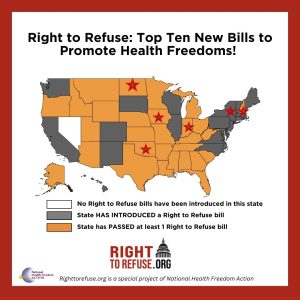
Right to Refuse: Top Ten New Bills to Promote Health Freedoms!
January 22, 2026
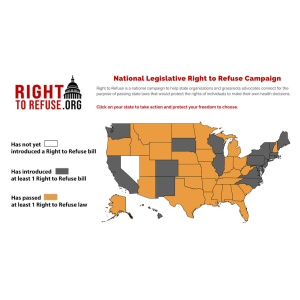

Will Health Freedom See Gains In 2026?
January 8, 2026
